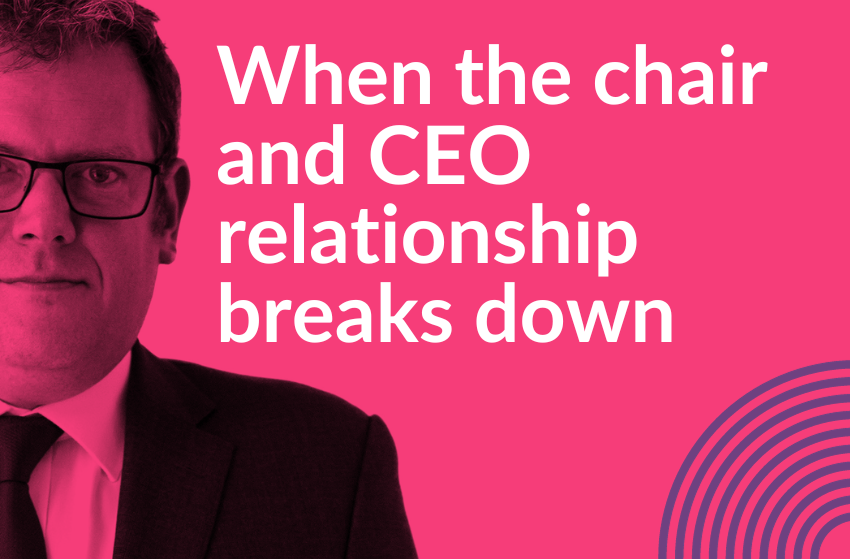It’s no wonder the Chair and CEO relationship has been widely discussed over the years given how vitally important it is to organisational success. Yet despite the amount it’s discussed, this often-complex relationship is not always a successful one.
Most Further Education organisations enjoy a positive Chair and CEO relationship. A relationship founded on trust, respect and transparency. One where much hard work has taken place on both sides to define and nurture the relationship over time. However, on occasion, the relationship will completely break down.
Sometimes the ‘power’ dynamic between the Chief Executive and Chair will need to be flipped, whilst the formal accountability remains. Far more complex than the well-known (but probably not very rooted in real life) ‘either back me or sack me’ expression conveys, sometimes a Chief Executive will need to seek the removal of their Chair.
It hardly needs to be said that this could be messy.
However, in Further Education we believe it may be the case that there are not enough ‘clean’ ways to remove a Chair who just won’t go. Post-reclassification this may be something that the Government, especially, needs to give some further thought to.
When the Chair is at fault
There may be fault on both sides when a Chair needs to go, of course. However, the organisation’s best interests (what is best for its learners) must always be prioritised. If it is decided that the CEO must go, then a clear line of accountability between a CEO and the Chair/Board normally supports a clear exit strategy. We do, though, want to spend some time on the slightly knottier issue of, what if the Chair is culpable and must go?
Some Colleges do have procedures for exiting Board members including the Chair, but often these are written after the event. Therefore, we would encourage all colleges to ensure that they have procedures in place for exiting board members. Critically, this should include the Chair.
We previously wrote that there are benefits to paying Chairs in this sector: We can see one such benefit in a scenario where a College needs to exit its Chair. A remunerated contract that sets out how the Chair’s performance will be managed could make the exiting of a Chair more straightforward.
Knowing when the Chair should go (even when they don’t know it themselves!)
Boards and perhaps also government and its agencies might want – almost by default – to at least ask the question of whether the chair should remain following the appointment of a new Chief Executive. New Chief Executives normally arrive with high levels of ‘small p’ political capital to spend and they typically have a mandate to strike out in new directions. How such a mandate settles with Chairs who have perhaps been in post for many years is important to assess.
Other times when the question should be asked include when a college has had some particularly difficult outcomes, perhaps around funding or Ofsted inspection. It’s not impossible to imagine national political leaders setting an expectation that non-executive leaders should automatically stand down following a systemic or persistent organisational failure, although the role of executive failure would need to be carefully considered alongside the role of the chair and Board. In any event, central government will always be careful in how it positions itself in relation to both the employment rights of senior leaders and appointments such as chairs of education and training providers. Regardless, paying chairs would make nudging (in policy terms) towards this aspect of accountability easier.
Other routes to initiate Chair change?
Board members – probably the Vice Chair and/or Committee Chairs – telling the Chair their time is up, is a time-honoured and informal way to move a Chair on. It is a difficult action to take though, especially when Chairs are still mostly volunteers. There is often loyalty around the board table to a Chair. Rightly or wrongly friendships are likely to influence the situation. This course of action can make other board members feel uncomfortable.
The governing body should have the formal authority under the College Instrument and Articles to remove a Chair when the CEO and Chair relationship has broken down. It would usually and properly seek legal advice to ensure all compliance with relevant laws and that due process is followed. For example, the Chair must have the right to respond.
Ultimately the board should be able to vote on whether to remove the Chair. It is imperative that a College has these procedures in place to deal with those obvious (and rare) scenarios where a Chair must be removed swiftly, for instance, financial issues, that have perhaps necessitated police involvement – and where a Chair will not voluntarily resign their position following a conviction, for example. From our conversations with Heads of Governance, it is not clear if all Colleges have written out how these sorts of situations will be properly handled.
Will the Government take a closer interest in the Chair post-reclassification?
An interesting development here is the reclassification of the sector. Will the DfE – possibly through the Further Education Commissioner – begin to nudge towards more interventionist behaviour at the level of College corporate governance? This may not only be following a damaging relationship breakdown but also in response to serious financial and quality issues. If the governance reform agenda, most recently set out in the 2021 White Paper, is to be taken seriously then perhaps the government should be pressing action on issues such as Chair length of tenure, for example.
A better understanding of what, when and how the DfE/FEC would intervene at the level of corporate governance would be useful for the sector. It may need to be codified. Should there be more formal routes through which concerns could be raised regarding college Chairs? Or is it most effective when carried out informally? A behind-the-scenes Commissioner conversation that can be relied upon to deliver a good/right outcome, with no need to resort to exercising the government’s powers or statutory functions?
Conclusion
For any serving CEO who has a particularly challenging relationship with their Chair, then our advice is to try every avenue to informally resolve the problem. This might involve other board members and it may even involve seeking external support and mediation.
In the absence of significant events like an Ofsted inadequate judgment or evidence following thorough appraisals (or even better, a performance management regime that flows from contractual remuneration) it may well be difficult to reach a reasonable and evidenced conclusion that the Chair is at fault and needs to go. As such, colleges need to ensure as a priority that the appraisal/performance management system is both in place and thoroughly detailed.
Unfortunately, this may not be enough. A chair could still refuse to go. In that scenario the Board and/or central government needs to exercise their rights and/or powers through appropriate policies and procedures and – ultimately – intervention via the DfE/FEC. Colleges and possibly also central government need to make sure that this is all in place and practically operable. From the conversations we have had it may be that more work needs to be done to ensure that this is indeed the case.
Co-authored by:
 Paul Aristides
Paul Aristides
Partner, Education Practice, GatenbySanderson
 Ian Valvona
Ian Valvona
Former Chair, Richmond-Upon-Thames College and Kensington and Chelsea College
